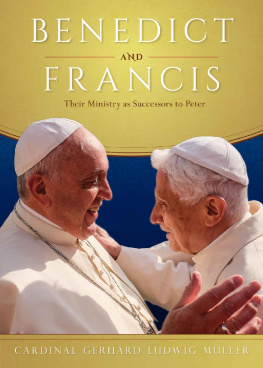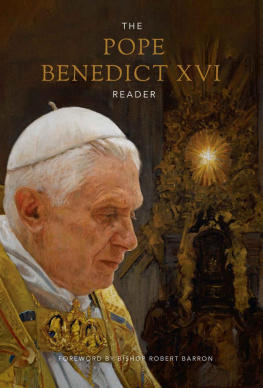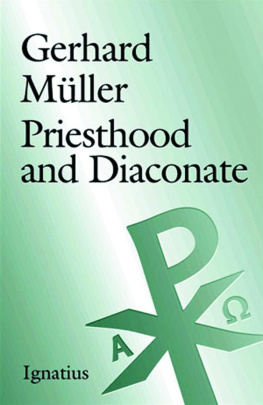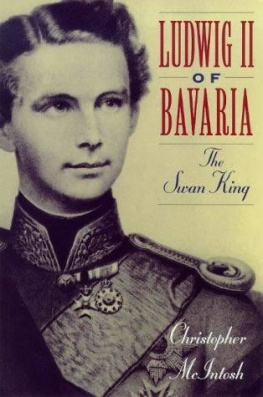Gerhard Ludwig Müller - Benedict and Francis
Here you can read online Gerhard Ludwig Müller - Benedict and Francis full text of the book (entire story) in english for free. Download pdf and epub, get meaning, cover and reviews about this ebook. year: 2017, publisher: Sophia Institute Press, genre: Religion. Description of the work, (preface) as well as reviews are available. Best literature library LitArk.com created for fans of good reading and offers a wide selection of genres:
Romance novel
Science fiction
Adventure
Detective
Science
History
Home and family
Prose
Art
Politics
Computer
Non-fiction
Religion
Business
Children
Humor
Choose a favorite category and find really read worthwhile books. Enjoy immersion in the world of imagination, feel the emotions of the characters or learn something new for yourself, make an fascinating discovery.
- Book:Benedict and Francis
- Author:
- Publisher:Sophia Institute Press
- Genre:
- Year:2017
- Rating:4 / 5
- Favourites:Add to favourites
- Your mark:
- 80
- 1
- 2
- 3
- 4
- 5
Benedict and Francis: summary, description and annotation
We offer to read an annotation, description, summary or preface (depends on what the author of the book "Benedict and Francis" wrote himself). If you haven't found the necessary information about the book — write in the comments, we will try to find it.
Benedict and Francis — read online for free the complete book (whole text) full work
Below is the text of the book, divided by pages. System saving the place of the last page read, allows you to conveniently read the book "Benedict and Francis" online for free, without having to search again every time where you left off. Put a bookmark, and you can go to the page where you finished reading at any time.
Font size:
Interval:
Bookmark:
Gerhard Cardinal Mller
BENEDICT
AND
FRANCIS
Their Ministry as Successors to Peter
Translated by Michael J. Miller
SOPHIA INSTITUTE PRESS
Manchester, New Hampshire
Original German edition: Benedikt und Franziskus: Ihr Dienst in der Nachfolge Petri: Zehn Jahre Papst Benedikt , copyright 2015 by Verlag Herder GmbH, Freiburg im Breisgau, Germany.
English translation copyright 2017 by Michael J. Miller
Printed in the United States of America. All rights reserved.
Cover design by Coronation Media.
On the cover: Pope Benedict XVI and Pope Francis meet, September 28, 2014, St. Peters Square (E818X9) Realy Easy Star/Alamy Live News.
Interior design by Perceptions Design Studio.
Scripture quotations are from the Revised Standard Version of the Bible Second Catholic Edition (Ignatius Edition), copyright 2006 National Council of the Churches of Christ in the United States of America. Used by permission. All rights reserved worldwide.
Citations from Heinrich Denziger, Enchiridion Symbolorum (cited as DH), are taken from the 43rd edition, edited by Peter Hnermann (San Franciso: Ignatius Press, 2012).
Citations from Vatican II documents are taken from Austin P. Flannery, ed., Documents of Vatican II (Grand Rapids, MI: William B. Eerdmans, 1975).
No part of this book may be reproduced, stored in a retrieval system, or transmitted in any form, or by any means, electronic, mechanical, photocopying, or otherwise, without the prior written permission of the publisher, except by a reviewer, who may quote brief passages in a review.
Sophia Institute Press
Box 5284, Manchester, NH 03108
1-800-888-9344
www.SophiaInstitute.com
Sophia Institute Press is a registered trademark of Sophia Institute.
Library of Congress Cataloging-in-Publication Data
Names: Mller, Gerhard Ludwig, author.
Title: Benedict and Francis : their ministry as successors to Peter / Gerhard
Cardinal Mller; translated by Michael J. Miller.
Other titles: Benedikt und Franziskus. English
Description: Manchester, New Hampshire : Sophia Institute Press, 2017. |
Includes bibliographical references. | Petrine office
Identifiers: LCCN 2017012271 | ISBN 9781622824588 (pbk. : alk. paper) ePub ISBN 9781622824595
Subjects: LCSH: Popes Primacy. | Apostolic succession. | Benedict XVI, Pope,
1927- | Francis, Pope, 1936- | Catholic Church Doctrines.
Classification: LCC BX1805 .M8513 2017 | DDC 262/.13 dc23
LC record available at https://lccn.loc.gov/2017012271
Contents

The Primacy of Peter in the Pontificate of Benedict XVI
The Primacy of Peter in the Pontificate of Benedict XVI

Rome, Campo Santo, April 17, 2015
On April 19, 2005, the Catholic world heard the unforgettable words from the Loggia [balcony] of Saint Peters Basilica: Annuntio vobis gaudium magnum. Habemus Papam: Eminentissimum ac Reverendissimum Dominum Josephum Sanctae Romanae Ecclesiae Cardinalem Ratzinger. The pontificate of Benedict XVI lasted almost eight years, until February 28, 2013.
This is not the occasion to evaluate the place of this pontificate in Church history or to get involved in controversies that arise in evaluating any historical personage. Rather, it is a matter of asking theologically how our faith in Jesus Christ was promoted by Pope Benedict and how we were led to a deeper understanding of the whole mystery of salvation: the revelation of the Triune God and consequently of the Churchs mission in our time.
Peter as the visible principle of unity
The popes, as successors of Peter, are the visible head of the pilgrim Church, and as pastors and teachers of the Universal Church they are vicars of Jesus Christ, who, on account of the Incarnation, is inseparable from the Church, His Body.
The cardinals are not the ones who confer authority to the newly elected pastor of the Universal Church. Therefore, neither does the Pope exercise his authority in the name of the Church, or of the College of Bishops, which he heads, or of the Roman Church, which, by means of the College of Cardinals and the dicasteries of the Roman Curia, shares responsibility for the Popes duties with regard to the Universal Church. The Pope answers to Jesus Christ alone and is supported in his universal ministry by the Church of Rome. Jesus Christ, the Lord and Head of His Church, is the sovereign; from Him proceeds all spiritual authority to govern, teach, and sanctify the people of God in the power of the Holy Spirit (cf. Lumen Gentium [ LG ] 20). The deliberations of the cardinals in the preconclave, along with their search for a suitable candidate and a coalition of votes forming a moral majority of more than two-thirds in the conclave, are only a prayer to God: Show us whom you have chosen (cf. Acts 1:24).
Jesus Christ, the true Head of the Church, bestows on the Bishop of Rome, as the successor of the apostle Peter, the fullness of authority to represent Him visibly as the universal teacher and pastor in the pilgrim Church on earth. The sacred primacy belonging to the Bishop of Rome, with its infallible teaching authority, is nothing less than the actualization of the perpetual and visible principle and foundation of the unity of faith and the communion that Christ Himself instituted forever in the Church in the person of Saint Peter (cf. LG 18). The primacy of the Roman Church with its bishop is due not to a claim of superiority over other local churches or to some will to power cleverly organized over the centuries by the clergy in the capital of an empire, but rather to the foundational will of the Lord of the Church. Peter suffered martyrdom in Rome, and thus his primatial apostolate devolves upon the Church of Rome and consequently upon its visible head, the Bishop of Rome. The primacy of Peter did not flare up at some point over the real world as an ideal, only to grow dim over the course of history and increasingly lose its contour in historys vicissitudes. In order to comprehend the nature and mission of the episcopal ministry and of the primacy, one must go beyond a naturalistic understanding of the Church as a legal assembly. The Church has its origin in Gods salvific will and is the instrument thereof. By its nature and mission it is not merely a religious assembly organized by men. The dualism between a supratemporal ideal image and its pale reflection in its historical realization must be overcome also.
The one mediator, Christ, established and ever sustains here on earth his holy Church, the community of faith, hope and charity, as a visible organization through which he communicates truth and grace to all men.... This is the sole Church of Christ which in the Creed we profess to be one, holy, catholic and apostolic, which our Saviour, after his resurrection, entrusted to Peters pastoral care (Jn 21:17), commissioning him and the other apostles to extend and rule it (cf. Mt 28:18, etc.), and which he raised up for all ages as the pillar and mainstay of the truth (1 Tim 3:15). ( LG 8)The Church as incarnate reality
Only in terms of the Incarnation is the utter novelty of the Church revealed to us: it signifies the real and symbolic presence of the Lord. Head and body: the one Christ and the whole Christ (Augustine, Sermo 341, 1). With this famous formula Augustine, the lifelong conversation partner and friend of the theologian Joseph Ratzinger, put the Pauline understanding of the Church in a nutshell. God is not merely an ideal of pure reason; neither did Christ merely found an ideal image of Church. The Second Divine Person assumed human nature, and by that very fact the visible communion of the disciples who followed Christ also became a sacrament that represents and concretely brings about the supernatural fellowship [Lebensgemeinschaft] of the faithful (cf. LG 8).
Next pageFont size:
Interval:
Bookmark:
Similar books «Benedict and Francis»
Look at similar books to Benedict and Francis. We have selected literature similar in name and meaning in the hope of providing readers with more options to find new, interesting, not yet read works.
Discussion, reviews of the book Benedict and Francis and just readers' own opinions. Leave your comments, write what you think about the work, its meaning or the main characters. Specify what exactly you liked and what you didn't like, and why you think so.









